Araujo, F.J.D.O., de Lima, L.S.A., Cidade, P.I.M., Nobre, C.B., & Neto, M.L.R. (2020). Impact of Sars-Cov-2 and its reverberation in global higher education and mental health. Psychiatry Research 288(112977). https://doi.org/10.1016/j.psychres.2020.112977
Baños (2020, May 8). How to deal with the psychological impact of Covid-19 (Office of the Principal, Interviewer). University of Valencia. https://www.uv.es/uvweb/uv-news/en/news/how-deal-psychological-impact-covid-19-1285973304159/Novetat.html?id=1286128538251&plantilla=UV_Noticies/Page/TPGDetaillNews
Bartlett, M. (2018). Using Flipgrid to increase students' connectedness in an online class. eLearn, 9(12). https://elearnmag.acm.org/archive.cfm?aid=3236703 https://doi.org/10.1145/3302261.3236703
[+]
Araujo, F.J.D.O., de Lima, L.S.A., Cidade, P.I.M., Nobre, C.B., & Neto, M.L.R. (2020). Impact of Sars-Cov-2 and its reverberation in global higher education and mental health. Psychiatry Research 288(112977). https://doi.org/10.1016/j.psychres.2020.112977
Baños (2020, May 8). How to deal with the psychological impact of Covid-19 (Office of the Principal, Interviewer). University of Valencia. https://www.uv.es/uvweb/uv-news/en/news/how-deal-psychological-impact-covid-19-1285973304159/Novetat.html?id=1286128538251&plantilla=UV_Noticies/Page/TPGDetaillNews
Bartlett, M. (2018). Using Flipgrid to increase students' connectedness in an online class. eLearn, 9(12). https://elearnmag.acm.org/archive.cfm?aid=3236703 https://doi.org/10.1145/3302261.3236703
Bueno i Torrens, D. (2021). Neurociencia para educadores [Neuroscience for educators] (7th ed.). Octaedro.
Craig, M. (2020). Engaging Flipgrid : Three levels of Immersion. In E. Alqurashi (Ed.), Handbook of Research on Fostering Student Engagement With Instructional Technology in Higher Education (185-210). IGI Global. https://doi.org/10.4018/978-1-7998-0119-1.ch011
Dörnyei, Z. (2003) Questionnaires in second language research: Construction, administration, and processing. Lawrence Erlbaum Associations.
Dörnyei, Z. (2007). Research Methods in Applied Linguistics. Oxford University Press.
Holbeck, R., & Hartman, J. (2018). Efficient strategies for maximizing online student satisfaction: Applying technologies to increase cognitive presence, social presence, and teaching presence. Journal of Educators Online, 15(3), 91-95. https://doi.org/10.9743/jeo.2018.15.3.6
Johnson, M., & Skarphol, M. (2018). The effects of digital portfolios and Flipgrid on student engagement and communication in a connected learning secondary visual arts classroom (Master's thesis). St. Catherine University repository. https://sophia.stkate.edu/maed/270.
Kafka, A. (2020, March 12). Shock, fear, and fatalism: As Coronavirus prompts colleges to close, students grapple with uncertainty. The Chronicle of Higher Education. https://www.chronicle.com/article/Shock-FearFatalism-As/248240
Kaufmann, R., & Vallade, J. I. (2020). Exploring connections in the online learning environment: student perceptions of rapport, climate, and loneliness. Interactive Learning Environments, pp. 1-15. https://doi.org/10.1080/10494820.2020.1749670
King, J., & Ng, S. K-Y (2018). Teacher emotions and the emotional labour of second language teaching. In Sarah Mercer & Achilleas Kostoulas (Eds.), Language teacher psychology (pp. 141-157). Multilingual Matters. https://doi.org/10.21832/MERCER9450
Krashen, S. (2013). Second language acquisition: Theory, applications, and some conjectures. Cambridge University Press.
Lowenthal, P., & Moore, R. (2020). Exploring Student Perceptions of Flipgrid in Online Courses. Online Learning, 24(4), pp. 28-41. https://doi.org/10.24059/olj.v24i4.2335
McLain, T. R. (2018). Integration of the video response app Flipgrid in the business writing classroom. International Journal of Educational Technology and Learning, 4(2), 68-75. https://doi.org/10.20448/2003.42.68.75
Phirangee, K., & Hewitt, J. (2016). Loving this dialogue !!!!: Expressing emotion through the strategic manipulation of limited nonverbal cues in online learning environments. In S. Tettegah & M. McCreery (Eds.), Emotions, Technology, and Learning (pp. 69-85). Elsevier. https://doi.org/10.1016/B978-0-12-800649-8.00010-9
Saçak, B., & Kavun, N. (2019). Rethinking Flipgrid and VoiceThread in the context of online collaborative learning theory. In E. Alqurashi (Ed.), Handbook of Research on Fostering Student Engagement with Instructional Technology in Higher Education (211-228). IGI Global. https://doi.org/10.4018/978-1-7998-0119-1.ch012
Shao, K., Pekrun, R., & Nicholson, L. J. (2019). Emotions in classroom language learning: What can we learn from achievement emotion research? System, 86, 1-11. https://doi.org/10.1016/j.system.2019.102121
Shoichet, C. E. (2020, March 13). Why the impact of Coronavirus could be particularly bad on college campuses. CNN. https://edition.cnn.com/2020/03/07/health/universities-coronavirus-impact/index.html.
Storbeck, J., & Maswood, R. (2015). Happiness increases verbal and spatial working memory capacity where sadness does not: Emotion, working memory and executive control, Cognition and Emotion, 30(5), pp. 1-14. https://doi.org/10.1080/02699931.2015.1034091
Strauss, V. (2020, April 6). Schools of more than 90 percent of the world's students closed during this pandemic. This graphic shows how fast it happened. The Washington Post. https://www.washingtonpost.com/education/2020/04/06/schools-more-than-90-percent-worlds-students-closed-during-this-pandemic-this-graphic-shows-how-fast-it-happened/
Tambini, A., Rimmele, U., Phelps, E. A., & Davachi, L. (2017). Emotional brain states carry over and enhance future memory formation. Nature Neuroscience, 20(2), 271-278. https://doi.org/10.1038/nn.4468
Tyng, C.M., Amin, H.U., Saad, M.N.M., & Malik, A.S. (2017). The Influences of Emotion on Learning and Memory. Frontiers in Psychology, 8(1454), pp. 1-22. https://doi.org/10.3389/fpsyg.2017.01454
UNESCO (2020, April 30). Prioritize health and well-being now and when schools reopen. https://en.unesco.org/news/prioritize-health-and-well-being-now-and-when-schools-reopen
[-]









